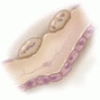Latest Articles
- Using biochemical markers of bone turnover in clinical practice
Although no guidelines to date recommend the widespread use of these markers in clinical practice, we believe they will eventually be accepted.
- When a quick sound bite won’t do
In the Action to Control Cardiovascular Risk in Diabetes (ACCORD) trial, why did more patients die if they got intensive therapy than if they got standard therapy? In this issue of the Journal, an investigator in this trial gives his analysis.
- Which patients benefit from carotid stenting? What recent trials show
Whether carotid stenting has any advantage over carotid surgery and which patients should undergo it are still topics of study and debate.
- An update on proteinuric chronic kidney disease: The dual-goal approach
To slow the progression of proteinuric chronic kidney disease, we may need to set goals for lowering both blood pressure and urinary albumin excretion, using drugs that block the renin-angiotensin-aldosterone system at multiple sites or in higher doses. However, this dual-goal approach needs to be validated prospectively.
- Biochemical markers of bone turnover: Useful but underused
Markers tell us the risk of fracture and are useful in patient management. But will insurance pay for testing?
- Nonalcoholic fatty liver disease: A manifestation of the metabolic syndrome
As we get heavier, our livers get fattier. Despite an explosion of research on nonalcoholic fatty liver disease and gains in understanding its epidemiology and pathogenesis, a number of issues remain unresolved, including how to treat it.
- Preventing renal disease progression: Can complete renin-angiotensin- aldosterone blockade work?
In view of the risks of complete blockade of the renin-angiotensin- aldosterone pathway, more data from clinical trials are needed before the general medical community widely applies this strategy to prevent progressive chronic kidney disease.
- Perioperative statins: More than lipid-lowering?
Soon, the checklist for internists seeing patients about to undergo surgery may include prescribing one of the lipid-lowering drugs called statins.
- Eosinophilic esophagitis: An increasingly recognized cause of dysphagia, food impaction, and refractory heartburn
This disease, which was not described as a distinct clinical entity until 1993, may be due to allergic and immune-mediated mechanisms similar to those of asthma and other atopic diseases.
- A case of refractory diarrhea
She has a history of irritable bowel syndrome, but could it be something more? A self-test on a clinical case.



